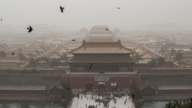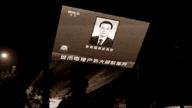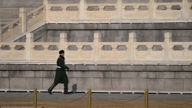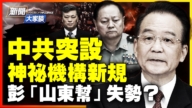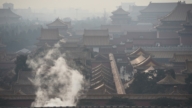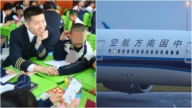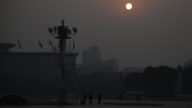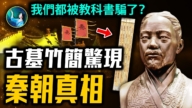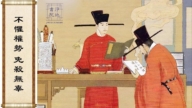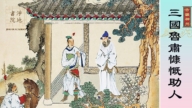【新唐人2013年03月12日讯】中共改革开放以来,政府机构已经经历了6次较大幅度的调整。这次中共在两会期间推行新一轮的大部制改革,被看做是“习李新政”的正式实施。整合后,国务院辖下机构将由现在的29个减少到25个,但与此同时,中共将不得不面对大部制改革后,部委“权力集中”和“过大”所带来的新危机。
根据3月10号披露的国务院机构改革和职能转变方案,国务院组成部门将减少4个,铁道部、国家新闻出版总署等部委将被撤并。
《新京报》报导,在当天的小组讨论会上,有记者质问国家发改委副主任杜鹰,说:发改委会不会借大部制改革扩权成“小国务院”?杜鹰承认,有关“发改委”权力过于集中的问题,可能是今后改革中需要解决的。
北京时政观察人士华颇指出,这次大部制改革的本意是想提高行政效率,却可能导致权力集中问题,而产生新一轮的腐败。
北京时政观察人士华颇:“权力集中后有一个问题就是产生腐败,可能会促使它的衙门作风更加严重,因为它们权力也更加集中了。而且还有一个问题,这次大部制改革会使原有利益群体产生影响,因为在中国利益已经是部门化了。但是大部制以后,权力集中是不是使这种利益部门化的现象更加严重?所以利益更集中在一些少的部门手里,又形成一种新的权力垄断。”
也有观点认为,大部委的权力过大,可能导致制度的权威受到挑战,中共总书记习近平的笼子如何关住大部制改革后产生的新老虎﹖如何把权力关进制度的笼子里﹖已经成为大部制改革后面临的新危机。
而旅居美国的政论家伍凡分析认为,大部制改革除了想减少各部门之间的矛盾和冲突,中共当局另一个目地,可能是想清理江泽民的那些余党和部门。
旅美政论家伍凡:“其中一个最大的部门就是铁道部,但是现在的结果,根据中共历来…几十年啦,越改部门越大,越改部门越多。现在也还是这个老套子。你把它减少了,它马上再成立个临时机构,临时办公室。”
3月10号,铁道部部长盛光祖对媒体表示,铁路职工不存在安置问题,都在就业岗位上,也不会裁员。
华颇:“盛光祖说不会淘汰人,它可能会以其他形式出现,可能会形成一些特殊的‘金鼎’,他语言里有千丝万缕的意思,也许有可能会集中官商,或形成新的一批‘红顶’的商人。”
香港《太阳报》的文章直接指出,中共大部制,改来改去,骗来骗去。看似衙门减少了,实际上减位不减人,纯粹是玩“障眼法”。
此外,据《京华时报》报导,中国行政体制改革研究会副会长汪玉凯表示,转变政府职能是这次大部制改革的最大着力点,国家部委以前掌握的很多项目资金,有望转移给地方,届时“跑部进京”的情况有可能会逐渐减少。
但伍凡认为,中共官员们吃喝惯了,他们绝对不会轻易放弃既得利益。
伍凡:“它毕竟不是一个民主国家,它是一个专制国家,这些官员就变成了大蛀虫了。美国的官员下来就下来了,走了就走了,与这个部门没有关系了,他们不,他们绝对不会放弃的。”
华颇认为,赋予大部委更大权力后,除了机构更加衙门化,更加高高在上。之外,同时只会培养这些部门的懒散作风。因此,中共实施大部制的实际效果,恐怕不会理想。
而民间对于中共政府机构频繁调整,却不能实际解决问题,以顺口溜辛辣讽刺说:“七姑八姨,裙带系栓。亲朋故旧,血肉相连。领导亲信,不能怠慢。张三有人,李四有钱。看看名单,都不简单。裁员裁员,裁谁都难。”
采访/朱智善 编辑/王子琦 后制/李勇
China Faces New Crisis After Reform
Since the reform and opening up in communist China,
government agencies have experienced 6 substantial changes.
During its 2 sessions, the Chinese Communist Party (CCP)
carried out a new round of reform, implementing the formal start of the new Xi-Li regime.
After integration, the number of departments under
the State Council will be reduced from 29 to 25.
Meanwhile, the CCP face the crisis of some committees
“having too much power" and “being too big".
The State Council will lose 4 of its departments on March 10
according to the State Council institutional reform and functional transformation program.
The reduction is due to a merger of the Ministry of Railways,
the State Press, the Publication Administration, and others.
http://news.163.com/13/0311/03/8PLFOER200014AED.html
Beijing News said that, on the day of the panel discussion,
a reporter had asked question to Du Ying—deputy director of National Development and Reform Commission (NDRC).
“if the reform will help NDRC become ‘a little State Council’”.
Du Ying admitted that the problem of excessive power
concentration in NDRC may need addressing in future.
Hua Po, current affairs observer in Beijing, points out that
this time most of the reform targeted administrative progress in efficiency,
however, this may lead to power concentrations
and generate a new round of corruption.
[Hua Po, Current Affairs Observer, Beijing]:
“Concentration of power leads to corruption and enhances the bureaucratic style.
Another problem is that the reform will
mostly impact the original interest groups.
In China, interests have been departmentalized
—will the concentration of power worsen this?
Thus, the interests are more concentrated in some small
departments and from a new monopoly of power."
Others believe that the ministries holding excessive power
may result in the system’s authorities being challenged.
How will the CCP’s new leader Xi Jinping contain
this crisis from immerging from the reform?
How will Xi’s locking the power in the system
generate a new crisis from the reform?
Wu Fan, political commentator in the U.S. believes that
most of the reform aims to reduce contradictions and conflicts among various departments.
It is possible that authorities may want to use the reform
to clean up remnants of Jiang Zemin’s faction.
[Wu Fan, Political Commentator, U.S.]:
“One of the largest departments is the Ministry of Railways;
decades of CCP reforms show that with each reform,
the Railways enlarges—the same trick’s being played now.
You can reduce its size, but it immediately establishes
new temporary agencies and offices.
On March 10, Sheng Guangzu, the Minister of Railways,
told media that the railway employees are not being laid off and will have no resettlement issues.
[Hua Po, Current Affairs Observer, Beijing]:
“He said no one will be made redundant.
However, it may appear in other forms—his remarks
contained layers of meanings—
maybe it would be more officials and businessmen,
or in the formation of a new group of top businessmen."
http://the-sun.on.cc/cnt/news/20130311/00418_003.html
The Sun newspaper of Hong Kong published an article
directly pointing out that the CCP likes to deceive the masses
and carry out more reforms but make fewer changes—saying
reducing agencies but retaining staff was a pure cover-up.
Beijing Times reported that Wang Yukai, Vice president
of Chinese Administrative Reform said that
“the key focus of this reform” was to transform the
government’s functions.
The national ministries can now transfer funding
to the local ministries, reducing the load on Beijing.
Wu Fan says, CCP officials are used to enjoying things
for free, and will not easily give up their vested interests.
[Wu Fan, Political Commentator, U.S.]:
“After all, it’s not a democracy; it’s a dictatorship, and these officials are big parasites.
When U.S. officials step down, they are gone and no longer
associate with the department, but Chinese officials linger and will not give up.”
Hua Po believes that giving more power to the big ministries
makes them not only more “bureaucratic” and “lofty”, but also more relaxed and lazy.
So, the actual effect of implementing the reform
will most likely not be ideal.
Chinese citizens realize that the frequent adjustments
in governmental agencies cannot actually solve problems.
Some people mockingly say: “All of them are friends or of
flesh and blood;
they are the leader’s cronies and you can’t
neglect them.
Looking at the list, none of them are easy to deal with
—it’s so hard to eliminate anyone.


